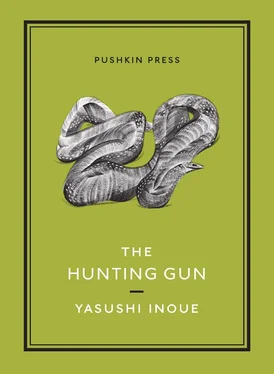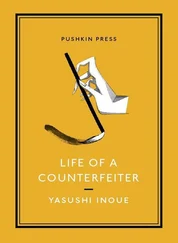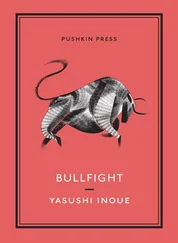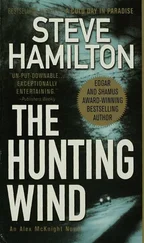My eyes still remember how beautiful the foliage was on Mount Tennō, in Yamazaki, washed by the fine autumn rain. What made it so beautiful? We stood under the eaves of the closed old gate of that famous tea house at Myōkian, just across from the station, waiting for the rain to end, gazing up at the mountain, which jutted up just behind the station, so huge and so close, and it was so beautiful it took our breath away. It was a sort of trick of the season, perhaps, that moment in November, and of the time of day, shortly before dusk. An effect of the particular atmosphere that day in late autumn, after an afternoon of intermittent drizzle — an array of colours so rich it was as if the whole mountain were dreaming them, colours so beautiful they made us afraid at the thought that we were going to climb up there, up the side of the mountain. Thirteen years have passed since then, yet the touching beauty of those leaves, on all the different trees, rises up before me as if I were there at this moment.
That was the first occasion you and I were ever able to spend time alone together. You had been dragging me to various spots on the outskirts of Kyoto since morning, and I couldn’t have been more exhausted, mentally and spiritually. I’m sure you must have been worn out too. As we climbed the steep, narrow path up the mountain, you said all kinds of outrageous things. Love is a form of attachment. I’m attached to my tea bowls, and there’s nothing wrong with that, is there? So how can it be wrong for me to be attached to you? And: We’re the only ones, just you and me, who have seen this magnificent foliage, here on Mount Tennō. And we saw it with each other, together. There’s no going back now. You sounded like a spoilt child, trying to wheedle your way into getting what you wanted.
All day long my heart had been straining, trying not to give in to you, and then suddenly it was as if you had pushed it down, and I relented — all on account of the silly, desperate things you said. The confused pity your reckless, overbearing statements evoked in me crystallized itself within my body — like flowers blooming everywhere inside me — as the joy of a woman in love.
It amazes me how easy, how simple it was to forgive my own infidelity when I had never succeeded in forgiving my husband, Kadota, for exactly the same failing.
*
Let us be wicked, you said. Wicked. You used that word for the first time when we stayed at the Atami Hotel. Do you remember? It was windy out, and the storm shutters on the window facing the ocean kept shaking and rattling all night. When you pushed it open around midnight to try and fix it, there was a fishing boat far out at sea that had caught fire and was burning high, bright red, like a cresset. People might be dying out there, we could see that, and yet the horror of it didn’t touch us — we saw only how beautiful it was. The second you closed the shutter, though, I became uneasy. You opened it again almost right away, but by then the boat must have burnt up, because there wasn’t a speck of light anywhere — just the dim, settled, bleary vastness of the ocean.
Until that night, I had still been struggling, deep in my heart, to break away from you. But after that night, after we saw the burning boat, an odd fatalism took hold of me. When you suggested we be wicked together, when you asked me to join with you and deceive Midori for the rest of our lives, I replied without a moment’s hesitation that if we were going to be wicked anyway, we might as well be evil. We would trick Midori, yes, but not only her — everyone, the entire world. That night, for the first time since we began having our trysts, I was able to sleep peacefully.
I felt as if I had glimpsed, in that boat blazing on the water, unbeknownst to anyone, the fate of our hopeless love. Even as I write this, that scene, those flames bright enough to overcome the darkness, rise up before me. What I saw on the ocean that night was without doubt a figure, the perfect figure, of the distress, the fleeting, this-worldly writhing that is a woman’s life.
*
There’s no point losing ourselves in such reminiscences, though. These last thirteen years, which began in the moments I have been describing, gave us our share of pain and anguish, but I feel even so that I have been the happiest person in the world. Cradled as I always was by your great love, your caring, I may even have been too happy.
I looked over my diary earlier today. I couldn’t help being struck by how often the words “death” and “sin” and “love” appeared there, and it made me feel — as if I didn’t know well enough already — how difficult the long years we navigated together have been; and yet, when I held that notebook in my palm and felt its heaviness, it had a happy weight. I may have been tormented by an omnipresent awareness of sin, a constant refrain of SIN SIN SIN , and I lived every day of my life staring down a vision of death, telling myself that I would die if Midori ever found out, I would make my amends to her, when she finally learnt, by dying, but all this merely stands as a measure of how irreplaceable my happiness was.
*
But oh, oh, who would ever have suspected that, beside this happy person I have been speaking of — you’ll find this a pretentious figure of speech, darling, but I don’t know how else to express it — there was another, different me. It’s the truth. Another woman lived inside me, of whose existence even I was unaware. Another me you didn’t know, and could never have imagined.
I remember you told me once that each of us has a snake living inside him. You had gone to see Dr Takeda, in the science department at the university in Kyoto, and I passed the time while you were with him looking one by one at all the different snakes on display in a row of cases tucked away in a corner of a long hallway in that dismal brick building. By the time you came out of Dr Takeda’s office half an hour or so later, the snakes were starting to get to me, and I felt a bit queasy. That was when you told me about the snakes — peering into one of the cases, you joked, “This is you, and this is Midori, and this is me… everybody has one of these inside him; there’s nothing to be afraid of.” Midori’s snake was a small, sepia-coloured one from some southern region; the one you said was mine came from Australia, and while it was small, too, its body was covered all over in white speckles, and its head came to a point, sharp like a drill. I still don’t know what you meant then. I never spoke with you about the snakes again, but somehow what you said stayed lodged in my chest, I remembered it, and every so often, when I was alone, I would wonder about what those snakes inside us were. Perhaps on some occasions they are egotism, and then jealousy, and then at other times destiny.
I haven’t understood about the snakes, even now, but I know that you were right that day, because there really was a snake living inside me. It revealed itself to me for the first time today. I can’t think of a better way to describe the other self I carried inside me, without knowing.
*
It happened this afternoon. Midori dropped by to look in on me, and when she arrived I was wearing that greyish-blue Yūki haori you had had sent up from Mito for me all those years ago — the one that used to be my favourite when I was younger. She seemed taken aback when she walked into the room and saw it, and for a second I thought she might comment on it, but she didn’t, she just sat there without saying anything. I supposed even she was shocked at my admittedly inappropriate choice of clothing, and so, since I was in a somewhat mischievous mood, I intentionally kept silent.
Suddenly she shot me an oddly icy look. “Isn’t that the haori you wore when you and Misugi went to Atami?” she said. “I was watching you that day, you know.” Her face was terrifyingly ashen, and her tone was so sharp she might as well have been jabbing at me with a short sword.
Читать дальше









![Ричард Деминг - Whistle Past the Graveyard [= Give the Girl a Gun]](/books/412176/richard-deming-whistle-past-the-graveyard-give-t-thumb.webp)

